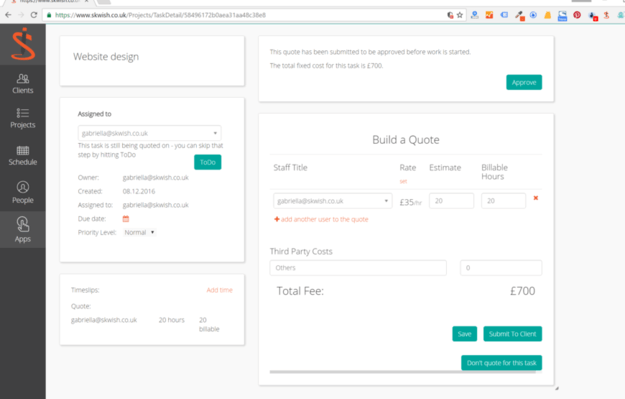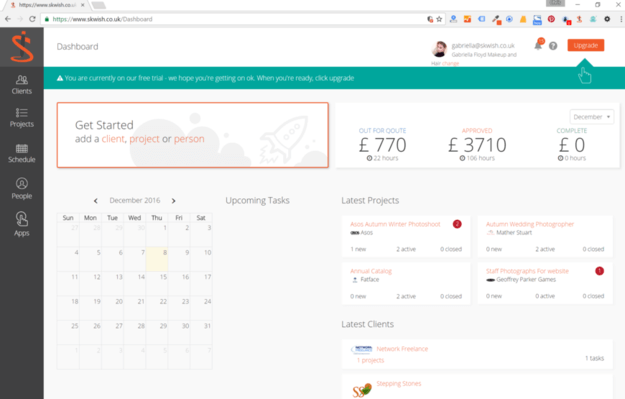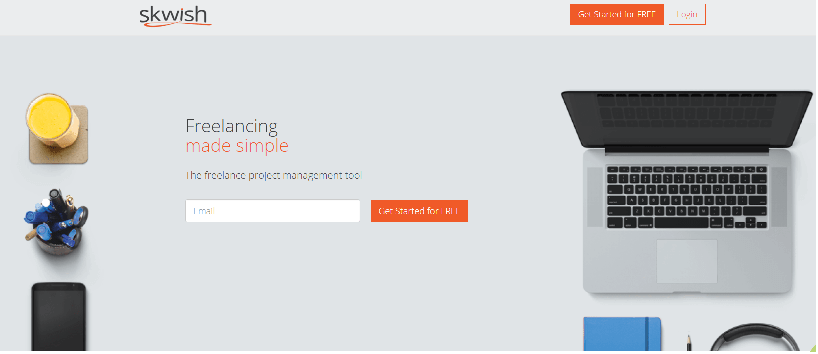Investing in freelance management solutions.
A look into the crowdfunding campaign of Skwish
Interview with Chris Williams Co-Founder and CC0 of Skiwsh, a website that helps freelancers focus more on their work and less on the administrative side of their business. Skwish will shortly be launching a crowd funding campaign on Invesdor and this will open opportunity for investing in their crowd funding campaign.
What problem is Skwish trying to solve?
Skwish looks to solve the three biggest issues freelancers face while running their businesses. Aside from finding work (we are addressing this too in future releases) freelancers tell us that
- being paid
- being paid on time
- managing clients in payment scenarios
are the biggest problems they face. In the UK the average freelancer spends 20 days chasing late payments, that’s an estimated £16.5 billion of lost income.
What is different in the solution Skiwsh is creating to others on the market?
Simply put, because Skwish is designed for freelancers, by a team of freelancers who understand how freelancers work. There are many, in fact over 300 ‘project management’ tools on the market that can help freelancers, many do use the likes of Trello, Asana and Wrike however, none of these tools were built specifically for the freelance market
Can you describe Skwish in numbers?
Skwish has a PMV (pre-money valuation) of £1.2m. In the few weeks Skwish has been live we have had over 1000 signups. Skwish is also available as an ‘Own Branded’ version for companies that want to personalise their accounts. We currently have a larger (29 building) company using a version of Skwish for their members. Skwish is debt free and is in its first month of revenue generating.
What are the key differences between Skwish and online freelance platforms such as upwork.com?
There is no comparison as Upwork is a platform for work/hire whereas Skwish is a platform where that work can be carried out, where freelancers can manage the clients they have on Upwork, Freelancer, PeoplePerHour etc.

What have been the greatest achievements of Skwish so far and what was the key to this success?
We measure success daily. Little wins, which ultimately grow to the success we founders know Skwish will be. For example testing and trialling landing pages – we’ve now had 8 different versions of our landing page, all with very subtle changes, each one better than the last. And that’s how we approach everything with Skwish. If it doesn’t work, change it till it does, when it does work, make it the best it possibly can be.
One of the greatest challenges to startups is cash flow, how is Skwish doing on this front? Cash flow is without doubt the most important aspect to a start-ups success. Skwish has a funding road map in place to sit alongside the business plan. The funding is required to accelerate growth and acquire users quickly.
How does Skwish make sure it is in sync with the needs of freelancers? What research was done for the development of this product?
We have completed our own, used commissioned research and got the info from the horse’s mouth so to speak, as all three founders are freelancers. We’ve also spoken and listened at many meetups, conferences and co-working spaces to get a real feel for what freelancers not only want, but need.

Can you share more details about the Skwish Crowdfunding Campaign?
Skwish is in the ‘Hidden’ phase on the Invesdor Website here – https://www.invesdor.com/en/pitches/796 We are looking to raise between £200,000 and £305,000 for equity share of between 14.8% and 20% – with a valuation of £1.2m
How would you describe the team and office culture at Skwish?
We are a founding team of three – with three offices, as we all work remotely. We communicate daily via Skwish as active users, and through the tools we’ve used for years (all of which will be integrated with Skwish as we travel through the development road map) We also have a small number of regular freelancers that we hire, again all remote. As a team we tend to meet weekly face to face. This works really well for us and I guess is testimony to how the vast majority of our user base work.
In your opinion what is the defining action or moment between a business idea in one’s mind and shaping that idea into a marketable product or service?
For me, getting your idea onto paper and create a MVP as quickly as possible, test and prove your concept, ask for constructive criticism and above all be prepared to fail. If you do fail… it’s not game over, it’s lesson learnt.
This investment is suited to high net worth or sophisticated investors careful due diligence should be carried out on all investment ideas listed on InvestItIn.com.












